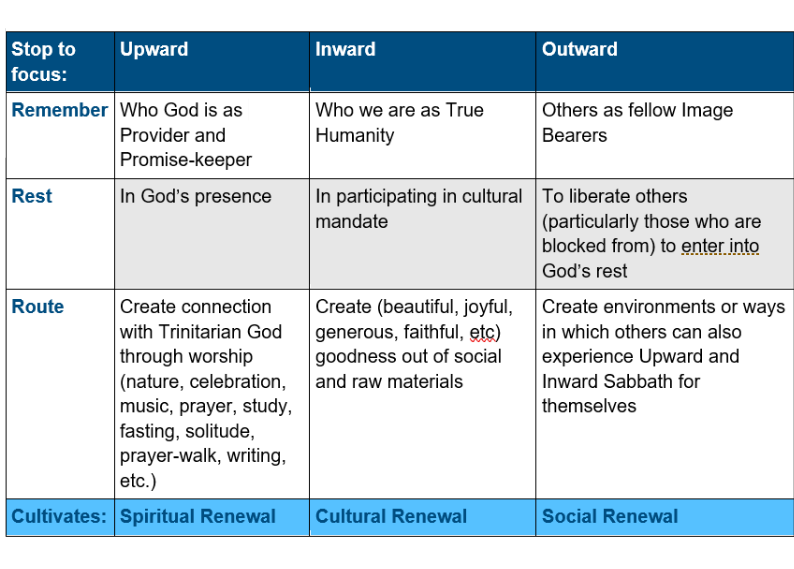Do you practice a regular rhythm of Sabbath? Do you “Sabbath”? What does it even mean when we use “Sabbath” as a verb? In fact, what is Sabbath?
Something Important
Generally speaking for many of us, when we hear the word “Sabbath” our thoughts go to attending a Sunday morning church service, hearing a sermon, participating in musical worship, talking story with a few people from church, and then going on with the rest of your Sunday afternoon.
For others, Sabbath reminds us of an unattainable ideal where we are just recovering from our exhausting week and desiring a way to check-out or recharge so that we enter another grueling week ahead.
Whether we think that Sabbath is just about church service or a way to recuperate from burn-out, it is something that God addresses over and over again — which must mean that it’s something that, as followers imitating Jesus, we need to piece together for our personal rhythms.
Observe the Sabbath day, to keep it holy, as the Lord your God commanded you. Six days you shall labor and do all your work, but the seventh day is a Sabbath to the Lord your God. On it you shall not do any work, you or your son or your daughter or your male servant or your female servant, or your ox or your donkey or any of your livestock, or the sojourner who is within your gates, that your male servant and your female servant may rest as well as you. You shall remember that you were a slave in the land of Egypt, and the Lord your God brought you out from there with a mighty hand and an outstretched arm. Therefore the Lord your God commanded you to keep the Sabbath day.
Deuteronomy 5:12-15 ESV
Why Sabbath
The word “Sabbath” was first introduced only after the Israelites made their exodus out of Egyptian slavery into a freed people of the one and only God. As God’s people, set apart to share with the rest of the nations what it looks like to be led and shaped by God Himself for the flourishing of the world, it was a practice to help God’s people remember and rest — but to remember and rest in a particular way.
Sabbath rest helps to 1.) set God’s people apart and remember and rest in God as deliverer and provider and 2.) establish rest for everyone and everything under our care and influence.
At about that time Jesus was walking through some grainfields on the Sabbath. His disciples were hungry, so they began breaking off some heads of grain and eating them. But some Pharisees saw them do it and protested, “Look, your disciples are breaking the law by harvesting grain on the Sabbath.”
Jesus said to them, “Haven’t you read in the Scriptures what David did when he and his companions were hungry? He went into the house of God, and he and his companions broke the law by eating the sacred loaves of bread that only the priests are allowed to eat. And haven’t you read in the law of Moses that the priests on duty in the Temple may work on the Sabbath? I tell you, there is one here who is even greater than the Temple! But you would not have condemned my innocent disciples if you knew the meaning of this Scripture: ‘I want you to show mercy, not offer sacrifices.’ For the Son of Man is Lord, even over the Sabbath!”
Then Jesus went over to their synagogue, where he noticed a man with a deformed hand. The Pharisees asked Jesus, “Does the law permit a person to work by healing on the Sabbath?” (They were hoping he would say yes, so they could bring charges against him.)
And he answered, “If you had a sheep that fell into a well on the Sabbath, wouldn’t you work to pull it out? Of course you would. And how much more valuable is a person than a sheep! Yes, the law permits a person to do good on the Sabbath.” Then he said to the man, “Hold out your hand.” So the man held out his hand, and it was restored, just like the other one! Then the Pharisees called a meeting to plot how to kill Jesus.
Matthew 12:1-14 NLT
Another starting point in thinking through what Sabbath truly is, we need to recognize that Jesus put his life on the line to define it — it was so important that the instigating case for Jesus’s own death was the belief that Jesus was breaking the Sabbath law.
So, what does Sabbath mean for Jesus? His focus was on remembering who we are as image bearers of God and resting – settling in – into that identity and calling — which, again, includes the flourishing of all under our care and influence. Jesus defined Sabbath as practicing who we are meant to be and do in the Kingdom of God.
Thus the heavens and the earth were completed in all their vast array. By the seventh day God had finished the work he had been doing; so on the seventh day he rested from all his work. Then God blessed the seventh day and made it holy, because on it he rested from all the work of creating that he had done.
Genesis 2:1-3 NIV
So, the discrepancy that Jesus put his life on the line for the sake of what Sabbath means for us, this commandment that is meant to set us apart and point for others the way of God and being truly human, causes us to go back to the beginning.
In Genesis, we see that God Himself, after the progressive work of days one through six, after everything He created and cultivated was “very good”, He took the seventh day, set it apart, and rested into creation. He enjoyed it. He participated in it. He blessed it and allowed for creation to flourish in it. God practiced Sabbath from the very beginning.
In light of all of this, what does Sabbath mean?
Remember and Rest
Sabbath, שבת (“Shabbat”), literally means to intentionally stop, or take a pause, in order to remember and rest. And the word “rest” נוּחַ (“nuach”) more so means to “settle in” or “establish”. Sabbath means to stop what you’re doing, remember God as deliverer and provider, and out of that satisfaction and assurance, settle into and establish your identity and call for the flourishing of those under your care and influence.
What can this look like in our postmodern world of busy-ness and performance-based culture, where success is often measured, even in our roles as leaders in missional communities, in how much we work and produce? How do we practically practice remembering and resting?
Stop in order to practice 3 things:

What do these ultimately create? What is the purpose of Sabbath?
In a nutshell, Sabbath is to practice the reality of the Kingdom of God, on a regular basis so that our hope (in God’s full presence, our full humanity, and culture’s full renewal) can be experienced little by little in the here and now.
Sabbath is to practice, in the midst of a broken world, on this side of new creation, an imagination of what the Kingdom of God can be like. We remember and rest in God as deliverer and provider, in how we as true humanity partner with God to create and cultivate culture around us for the flourishing of those under our care and influence. We remember and rest in liberating others as fellow image-bearers of God to enjoy and enter into the same remembrance and rest. Sabbath helps to set into our personal rhythms and calendars, a means to cultivate spiritual, cultural and social renewal. And that is worth stopping for.

Share this Post

